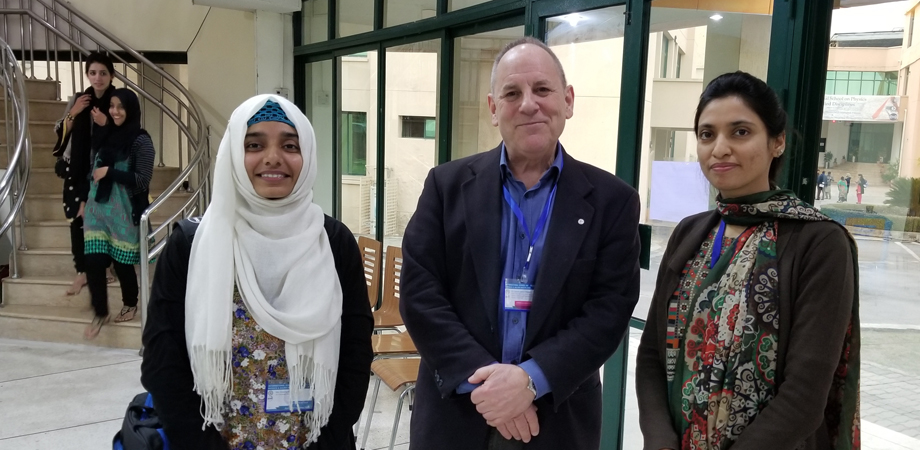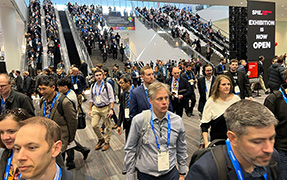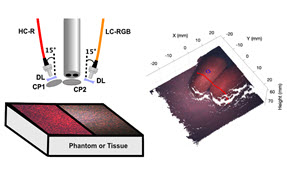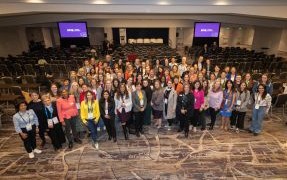Joe Niemela: Always Connect

From his base at the Abdus Salam International Centre for Theoretical Physics (ICTP) Joe Niemela, a senior research scientist emeritus and advisor on international programs and applied physics, spends quite a bit of his time traveling to developing countries on behalf of UNESCO, working with local scientists to support their research, education, teacher-training, and outreach activities. "Our mission is to foster science research and education throughout the world," he says. "I meet young scientists, and I meet students. I encourage them to participate in our programs, see who's got some potential, who has enthusiasm. The joy I get from it is not just about connecting people — it's about creating opportunities for people to work together in an enjoyable, positive way while empowering local scientists and teachers to nurture local students. It's particularly great to see students experiencing the fun aspects of science through our activities." If you can get students to enjoy science, says Niemela, that's one terrific way of building potential future scientists.
Originally focused mainly as a research scientist — "I did low-temperature physics plus turbulence, so my work straddled engineering and physics. On the engineering side, we were trying to develop a new generation of wind tunnels based on superfluid helium through a NSF program, with tremendous encouragement at the time from Dennis Bushnell, chief scientist at NASA's Langley Research Center" — Niemela has built his academic successes into internationally interactive ones, garnering recognition from across the globe.
Vice chair of the American Physical Society Forum on International Physics, past member of the Scientific Council of Centro Fermi, and chair of both the European Physical Society's Physics for Development Group and the TWAS Research Grants Committee for Physics, Niemela is the 2016 recipient of the Dwight Nicholson Medal of the American Physical Society, the 2015 Galileo Galilei Silver Medal from the Italian Physical Society, and the SPIE Educator of the Year Award in 2011. He also served as the global coordinator of UNESCO's 2015 International Year of Light and Light-based Technologies, and remains integrally involved in its legacy initiative, the International Day of Light (IDL), which marks its third anniversary this year, a particularly evocative celebration this year since 2020 also marks the 60th birthday of the laser.
The IDL effort, generated by a consortium of scientists, industry leaders, and organizations including SPIE, was, for Niemela, a natural extension of the work he was already doing for UNESCO: "All of our activities and efforts really tie into the kinds of things we encourage through the IDL, which is really a cross-global outreach activity to a public audience. The IDL focus is to raise awareness of photonics solutions to societal challenges while also getting people involved in their communities — getting communities together to celebrate arts, science, and sustainability. IDL is about building communities and showcasing science as an integral part of society. I think the worst thing I've always felt is for science to be seen as something that happens separately in an ivory tower: when you try to tackle problems affecting society — energy, climate change — you really need more than the technology people to make things actually happen."
This year, IDL will, of course, take a new shape in response to the coronavirus pandemic. ICTP has gone "all-in" with Zoom meetings, notes Niemela; while some activities have been postponed, many are still taking place via the virtual platform, along with weekly seminars and colloquia. And some activities are proceeding in a more creative fashion.
Niemela had planned to meet with teacher Mirwat Shamshad at Beaconhouse School in Islamabad in March and was going to speak with her physics class of high-school girls in advance of their participating in an online NASA and Smithsonian citizen-science astronomy project involving the search for exoplanets. The girls' participation in this project was intended as part of the Pakistani celebration of the International Day of Light, and, thanks to some fast-thinking flexibility, it still will be. "Mirwat is finding ways to work around the fact that the girls are in home isolation by utilizing various internet-based technologies. And while my trip is off the cards, we decided to connect her students with a scientist who could really motivate and inspire them in terms of STEM careers."
Mirwat and Niemela's brainstorming resulted in a terrific speaker: NASA scientist Sona Hosseini who worked with Niemela during the 2015 International Year of Light and who was recently recognized with a 2020 SPIE Early Career Achievement Award. "It is such a good idea, pairing Sona as a mentor with these high-school girls in Islamabad," says Niemela. "She has been a leader in SPIE student empowerment activities and was very enthusiastic about engaging with these students during this challenging time."
In terms of directly addressing the coronavirus pandemic, Niemela points out, scientists are contributing in many ways, in some cases facilitated by connections through professional societies. "This includes acting as a source of factual evidence-based information to policy makers in general, to working on innovative low-cost ventilator technologies in various labs around the world and performing relevant modeling and statistical analyses. And, of course, we should keep in mind that the communications that keep us together in this period of self-isolation are based on light technologies powering the internet."
That outlook dovetails nicely with IDL's overarching message. "It's a message of hope," affirms Niemela. "It focuses on seeing a better future for people through light sciences and encourages an understanding of how science works. We're not going to make scientists out of everybody, but we would like to have them understand what it is and perhaps what it is not — and that goes for parents and politicians as well as kids, teachers, as well as students. So it's really reaching out to communities as a whole."
Science, Niemela points out, is all around; it is part of our lives in more aspects than one and its calling for a holistic understanding and approach: "Take something like smart lighting, human-centric lighting: cool technology, right? But you also need people to worry about ethics concerns and potential unwanted physiological effects that may or may not be encountered in the long run. So you really need that wider view that goes beyond the competences of those involved in the technology development."
While optics is often seen as a discipline that has a very direct benefit on societies — think spectroscopy, food safety, security, remote sensing, malaria research, optical tweezers, lidar — Niemela is a big believer in making all science accessible to as many people as possible so that they can differentiate between good solutions and bad solutions.
"The world is becoming more technological and people have to be able to make informed decisions," says the research scientist who's mastered the arts of outreach and empowerment with a photonics focus. "They're part of society, they're making decisions for their communities, and they should have an understanding of science and what it means so they leverage and utilize available technologies to the benefit of their communities."
| Enjoy this article? Get similar news in your inbox |
|



